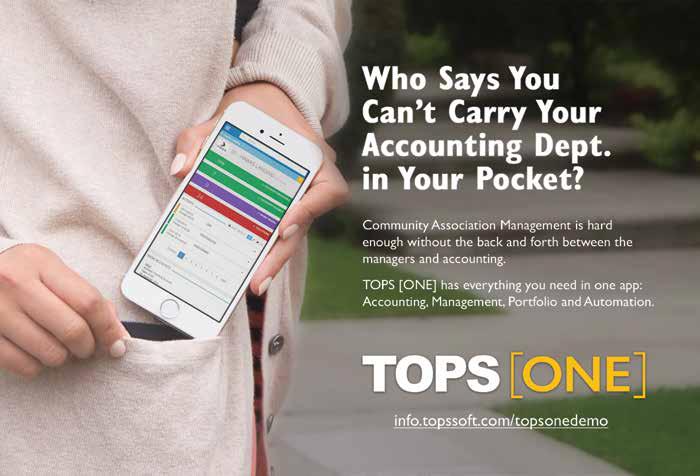
8 minute read
From the Roundtable
In this issue, our member contributors explore what it means to be a professional community manager and to pursue professionalism.
Webster defines the word professional to mean “characterized by or conforming to the technical or ethical standards of a profession, exhibiting a courteous, conscientious and generally businesslike manner in the workplace.”
In our most recent member survey our members were least satisfied with the respect and appreciation they receive from clients and client members. Abraham Maslow in his 1954 book Motivation and Personality proposed his famous hierarchy of needs. Nearing the top of this hierarchy is “esteem”; both self-esteem and self-respect – the desire to be accepted and valued by others. One path to the achievement of this desire is to self-identify ourselves as professionals. To have a successful community management career, we must all be committed to demonstrating professional, competent and consultative leadership with our boards and communities. As community management professionals, we have daily opportunities to declare our professionalism: how we dress, our email communication, our interaction with owners and board members and our conduct, attitude and behavior in board meetings, membership meetings and with our colleagues.
The insightful articles in this issue are a “call to action” for us to raise our game, see ourselves as professionals, take responsibility for our career development and to develop the emotional and soft skills necessary to not only deliver great community and client service, but also to garner the selfrespect and esteem important to a healthy life/work balance and a successful, long-term career in the professional community management industry.
On behalf of the CACM Board, John Cligny, CAMEx, CCAM-HR Board Chair
BY SCOTT SWINTON
the clock is ticking.
An unhappy homeowner just interrupted your site-walk with a rant on their front lawn. They’ve stopped talking and await your response. The next five seconds are critical. That's about how long you have to interpret what you just heard, process the relevant content and then formulate a response. After five seconds ... they will fear you have gone catatonic, so think fast.
emotional intelligence
how you respond
will set the tone for the balance of the conversation and possibly the balance of your relationship with this person. You may be brilliant, capable of conjugating verbs and graphing algebraic equations, but just because you're smart, that doesn't mean you're going to get this right. All the intelligence in the world will do you no good if this person suspects that you don’t care.
Continued on page 20
intelligence
FOR HOA MANAGERS


Self-Awareness – Spend some time alone and silent each day. Process the events of your previous day, and what lies ahead today. Where did you blow it? Who got under your skin? Why were they able to do that? Remind yourself regularly what is truly important in your life, for this day, at this particular moment… now call the board president and discuss the dead tree.
Social Awareness – Listen first when entering a meeting. Take the temperature of the room. Do they need your coaching or your empathy? Guess wrong and they will either fight you or trample you. And then at the next meeting – do it again, because the same people will not bring the same emotions each month. And, keep a sharp eye out for group-think, which can manifest itself in new and unique ways among the same set of people. Group-think will mulch your logic if you haven’t picked up on the cues and met it with a well-reasoned plan.
Self Management – Practice saying no to your first impulses in small ways, so when you need to swallow your pride or deep six your anger, it won’t be so obvious to those watching. Smile at the guy who just cut you off in traffic, genuinely wish him a good day and completely ignore him as you pass him on the exit ramp. If nothing else, your threshold of angst will be lower when the owner of #222 begins her daily email barrage. Bradberry and Greaves sagely challenge the reader to find something he can learn from every interaction. That practice alone will keep your emotions in the caboose, while you steam along intentionally toward lower blood pressure.
Relationship Management – Remember how you interacted with the board of directors when you first met them? Not quite the same anymore is it? Relationships are a journey, not a destination – and a little humility kicks up a tailwind. Relationship Management can be nearly achieved by simply demonstrating genuine concern about the opinion of the other party. Certainly, much depends on the actions of the other person, but maybe your good example will have some positive impact there too.
The fallout from a tense conversation will depend largely on your level of Emotional Intelligence (EQ). If there was ever an industry where a well-developed EQ is important, it’s the community association management industry. For so many reasons, which would take a series of books to unwrap, the HOA mindset offers ample opportunity for the emotionally intelligent to exercise his/her skills.
The term emotional intelligence was coined by Michael Beldoch in a 1964 paper, but was mainstreamed in 1995 by Daniel Goleman in Emotional Intelligence – Why It Can Matter More than IQ. The concept has since found its way into mainstream vocabulary and is now defined by A Dictionary of Psychology as, “the capability of individuals to recognize their own, and other people's emotions, to discern between different feelings and label them appropriately, to use emotional information to guide thinking and behavior, and to manage and/or adjust emotions to adapt environments or achieve one’s goal(s).” (above paragraph paraphrased from Wikipedia - https://en.wikipedia.org/wiki/Emotional_intelligence)
I recently walked away from a tense conversation with three employees, and wondered, if I’d handled it well. I honestly couldn't tell. Being the boss, I of course won the argument – but had I been right or simply the most assertive? I had just finished reading the book Emotional Intelligence 2.0 by Travis Bradberry and Jean Greaves, and like most of us armed with a new tool, I had tried to use it, consciously assessing myself throughout the conversation.
In retrospect, I failed on every level: self awareness, social awareness, self-management and relationship management – the EQ quartet described by Bradberry and Greaves, I had tanked. As they explain, our brains are hardwired to give emotion the upper-hand, and sure enough, my emotions had punched the clutch twice and were headed for high gear before my reason had even seen the green light.
Cringe with me, because you’ve done it too. And it’s not just that you failed to think before you spoke. A hasty reply is poor practice, but worse is forging a sharp reply and then delivering it with surgical precision – imagining anything good will come of it. Emotional intelligence is more than counting to ten, it’s finding ten ways that you might relate to the other party before formulating a response.
All of us can benefit from improved relationships – and in a nutshell, that’s what emotional intelligence is all about. Whether you approach life from a purely altruistic paradigm and want to make the world a better place for everyone, or you simply need to focus on some self-regulation and personal growth right now, EQ isn’t a bad place to start.
In conclusion, I want to circle back around to selfawareness. In Emotional Intelligence 2.0 Bradberry and Greaves
touch briefly on a recommendation – take time each day to be quiet and think.
Try and think of the last time you intentionally cleared away busyness, music, television, kids - and just thought in silence. How long did that event last? One minute, five minutes? Did you get bored and turn on the TV? Did the kids start arguing in the other room, or the phone ring, or did Facebook’s gravity suck you back?
Their point is well made. We intentionally cram every minute of our lives with activity, and then subdivide and cram in even more. We quickly believe the lie that busyness equals fulfillment. But until you take time to “know thyself,” you will likely continue to circle or worse: spiral. Emotional Intelligence is more natural to some than others, but the good news according to the experts is that unlike IQ, our EQ is not a locked-in destination, it too is a journey. Start your journey today.
Scott Swinton is CEO of Unlimited Property Services Inc. in Richmond.
Emotional Intelligence 2.0, Travis Bradberrry, Ph.D., and Jean Greaves, Ph.D., Copyright 2009 Coleman, Andrew (2008). A Dictionary of Psychology (3 ed.). Oxford University Press. ISBN 9780199534067.
Community Association Loans All the right tools for your next project.
How will you fund your next community project? Get the job done right with the Community Association Loan toolkit. You’ll get custom financing that’s perfect for your budget and your community. Your Community Association Loan toolkit includes: • Competitive interest rates • Flexible payment plans • Innovative loan structures • Fixed rate loans • Non-revolving lines of credit Get the cash you need today.
Lisa Ann Rea VP/Regional Account Executive 805-907-8452 Toll Free 866-800-4656, ext. 7500
lisa.rea@ mutualofomahabank.com Dylan Nix Regional Account Executive 415-580-2029 Toll Free 866-800-4656, ext. 7579
dylan.nix@ mutualofomahabank.com
Brendan Concannon Regional Account Executive 619-961-6346 Toll Free 866-800-4656, ext. 7480 brendan.concannon@mutualofomahabank.com
AFN45403_0213 Member FDIC • Equal Housing Lender Equal Housing Lende National Corporate Member of Community Associations Institute CACM Affiliate Member








